Refinishing a butcher block countertop is a rewarding project that can breathe new life into your kitchen space while preserving the natural beauty and functionality of the wood surface. Butcher block countertops are prized for their durability, warmth, and versatility, making them a popular choice for both traditional and modern kitchens. Here, we’ll explore the step-by-step process of refinishing a butcher block countertop, along with tips, techniques, and FAQs to help you achieve professional-looking results.
Assessment: Before beginning the refinishing process, carefully assess the condition of your butcher block countertop. Look for scratches, stains, dents, or any signs of wear and tear that need to be addressed during the refinishing process.
Preparation: Start by removing any items from the countertop and thoroughly cleaning the surface with a mild detergent and warm water. Allow the countertop to dry completely before proceeding to the next step.
Sanding: Using a handheld orbital sander or sanding block, sand the entire surface of the butcher block countertop in the direction of the wood grain. Start with coarse-grit sandpaper (around 80-grit) to remove any surface imperfections or old finish. Gradually switch to finer-grit sandpaper (such as 120-grit and 220-grit) to achieve a smooth and uniform surface.
Removing Stains: For stubborn stains or discolorations, you may need to use a more aggressive sanding technique or apply a wood bleach solution to lighten the affected areas. Follow the manufacturer’s instructions carefully and ensure thorough rinsing and drying before proceeding.
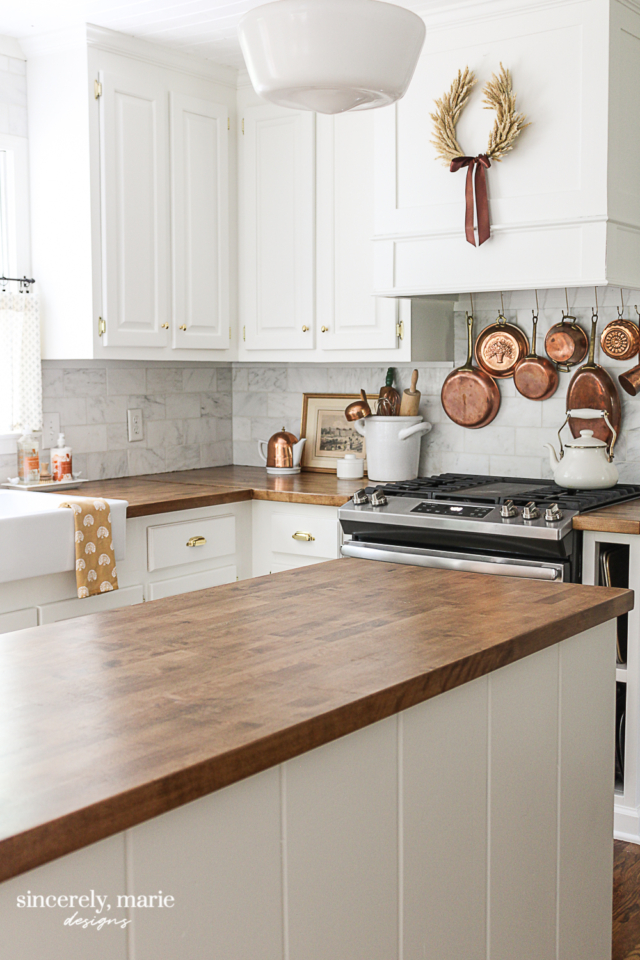
Repairing Damage: If there are any deep scratches, gouges, or dents in the butcher block countertop, consider filling them with a wood filler that matches the color of the wood. Allow the filler to dry completely before sanding it flush with the surrounding surface.
Applying Finish: Once the surface is sanded smooth and any repairs are completed, it’s time to apply the finish to protect and enhance the wood. There are several options for finishes, including mineral oil, food-grade butcher block oil, polyurethane, or a combination of beeswax and mineral oil. Choose a finish that suits your preferences and the intended use of the countertop.
Applying Oil Finish: If using a penetrating oil finish like mineral oil or butcher block oil, apply a liberal amount to the entire surface of the countertop using a clean cloth or brush. Allow the oil to penetrate the wood for several hours or overnight, then wipe off any excess oil with a clean, dry cloth.
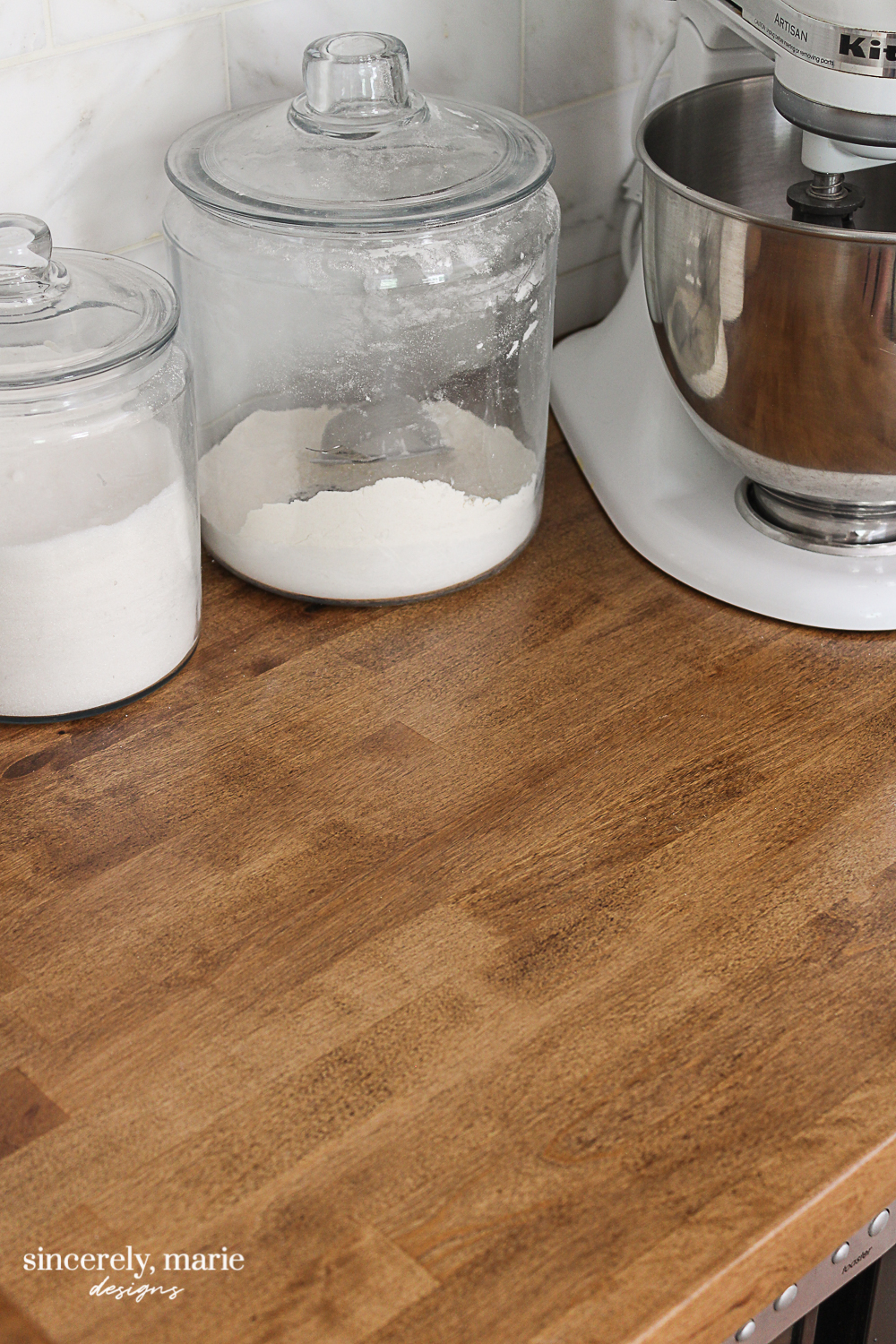
Applying Polyurethane Finish: If opting for a more durable and water-resistant finish like polyurethane, apply thin, even coats using a high-quality synthetic brush or foam applicator. Allow each coat to dry completely before sanding lightly with fine-grit sandpaper (such as 220-grit) and applying subsequent coats as needed.
Curing Time: Depending on the type of finish used, allow the butcher block countertop to cure and dry completely before placing any items or using the surface for food preparation. This typically takes several days to a week, depending on the ambient temperature and humidity levels.
Maintenance: To keep your newly refinished butcher block countertop looking its best, regularly clean it with a mild detergent and warm water, avoiding harsh chemicals or abrasive cleaners that can damage the finish. Periodically reapply a protective finish, such as mineral oil or butcher block conditioner, to maintain the wood’s luster and resilience.
Avoiding Moisture: It’s essential to protect butcher block countertops from excessive moisture exposure, as prolonged contact can cause the wood to swell, warp, or develop mold and mildew. Use trivets or hot pads to protect the surface from hot cookware and wipe up spills promptly to prevent water damage.
Avoiding Cutting Directly: While butcher block countertops are designed for food preparation, it’s advisable to use cutting boards or protective mats when chopping or slicing to avoid scratching or denting the wood surface. This helps preserve the integrity and appearance of the countertop over time.

Rejuvenating the Finish: Over time, the finish on butcher block countertops may wear away or become dull due to regular use and cleaning. To rejuvenate the finish, lightly sand the surface with fine-grit sandpaper and apply a fresh coat of finish according to the manufacturer’s instructions.
Seeking Professional Help: If you’re unsure about refinishing your butcher block countertop yourself or if the surface requires extensive repairs or restoration, consider hiring a professional woodworker or countertop specialist with experience in handling butcher block surfaces.
Enjoying Your Renewed Countertop: Once the refinishing process is complete, take a moment to admire your handiwork and enjoy the beauty and functionality of your newly refinished butcher block countertop. With proper care and maintenance, it will continue to enhance your kitchen for years to come.
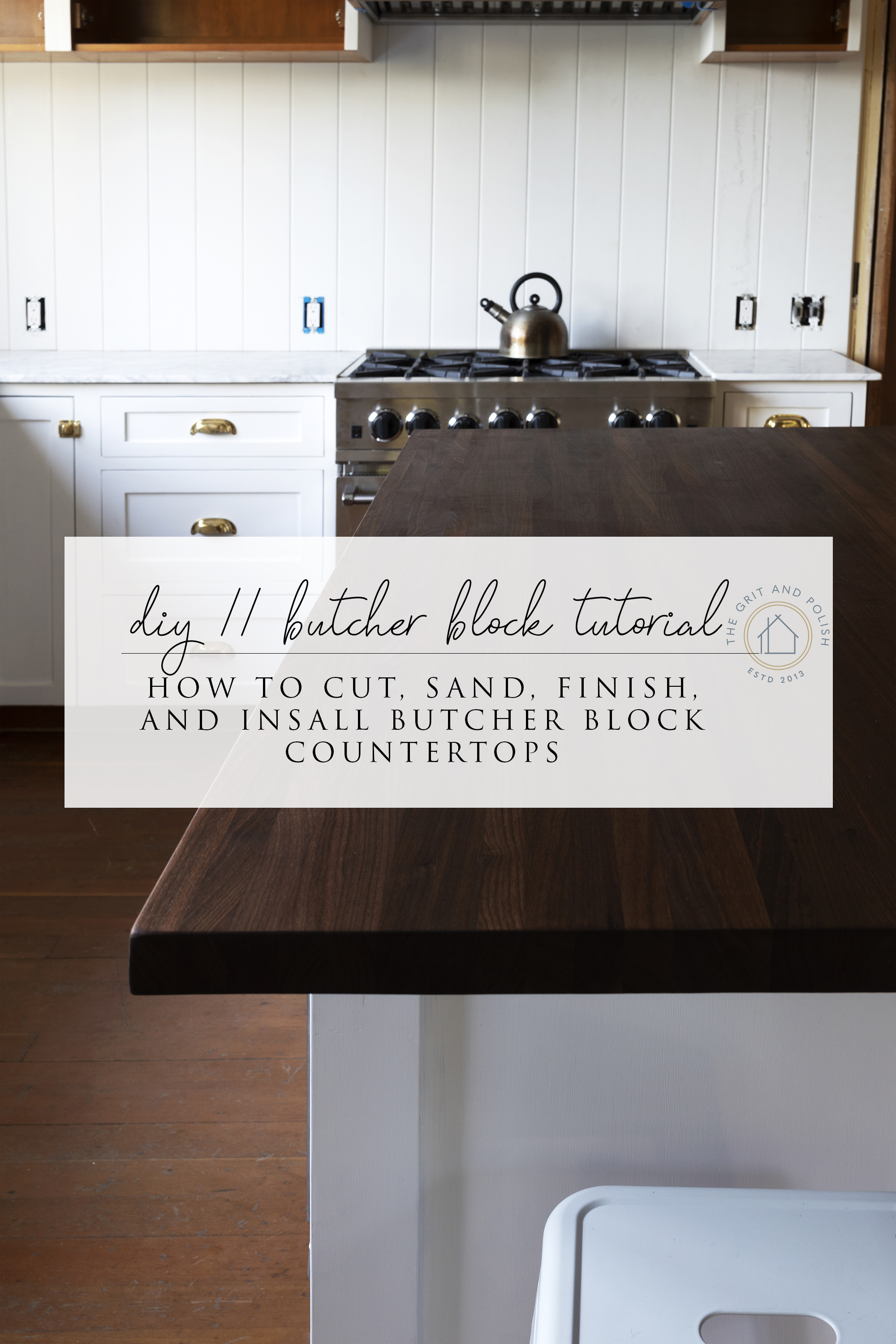
Can I use any type of finish on a butcher block countertop?
While there are various finishes available for butcher block countertops, it’s essential to choose a finish that is food-safe and suitable for use in a kitchen environment. Mineral oil, food-grade butcher block oil, and polyurethane are popular options.
How often do I need to reapply the finish on my butcher block countertop?
The frequency of reapplying the finish depends on factors such as the type of finish used, the amount of use the countertop receives, and the exposure to moisture. Generally, it’s recommended to reapply a protective finish every few months to maintain the wood’s integrity and appearance.
Can I sand out deep scratches or stains on my butcher block countertop?
Deep scratches or stains on a butcher block countertop may be sandable, depending on the depth and severity of the damage. However, extensive sanding may affect the overall thickness of the countertop, so it’s essential to assess the situation carefully and proceed with caution.
Is it necessary to seal the underside of a butcher block countertop?
While sealing the underside of a butcher block countertop is not strictly necessary, it can help prevent moisture absorption and minimize the risk of warping or swelling over time. Applying a coat of finish or sealer to the underside can provide added protection and prolong the lifespan of the countertop.
Can I use my butcher block countertop immediately after refinishing it?
It’s advisable to allow the finish to cure and dry completely before using the butcher block countertop for food preparation or placing any items on the surface. This typically takes several days to a week, depending on the type of finish used and the ambient conditions.
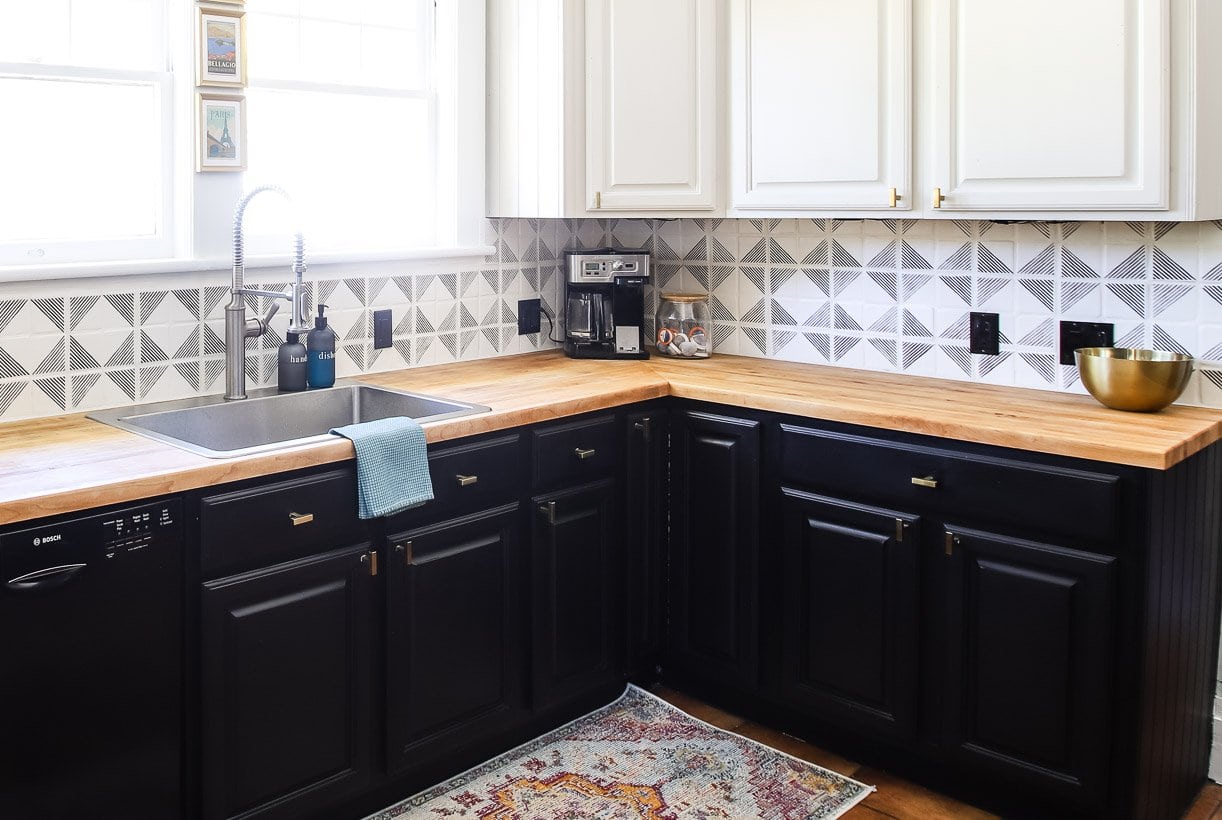
How We Refinished our Butcher block Countertop – Chris Loves Julia

How to Stain Butcher Block
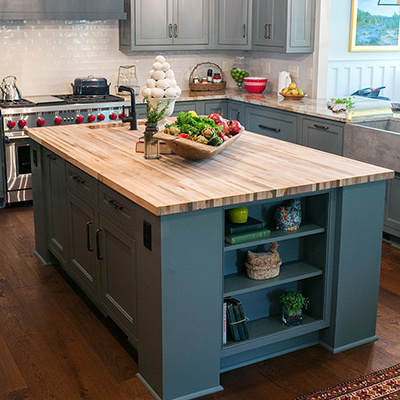
My Butcher Block Countertops Refinish
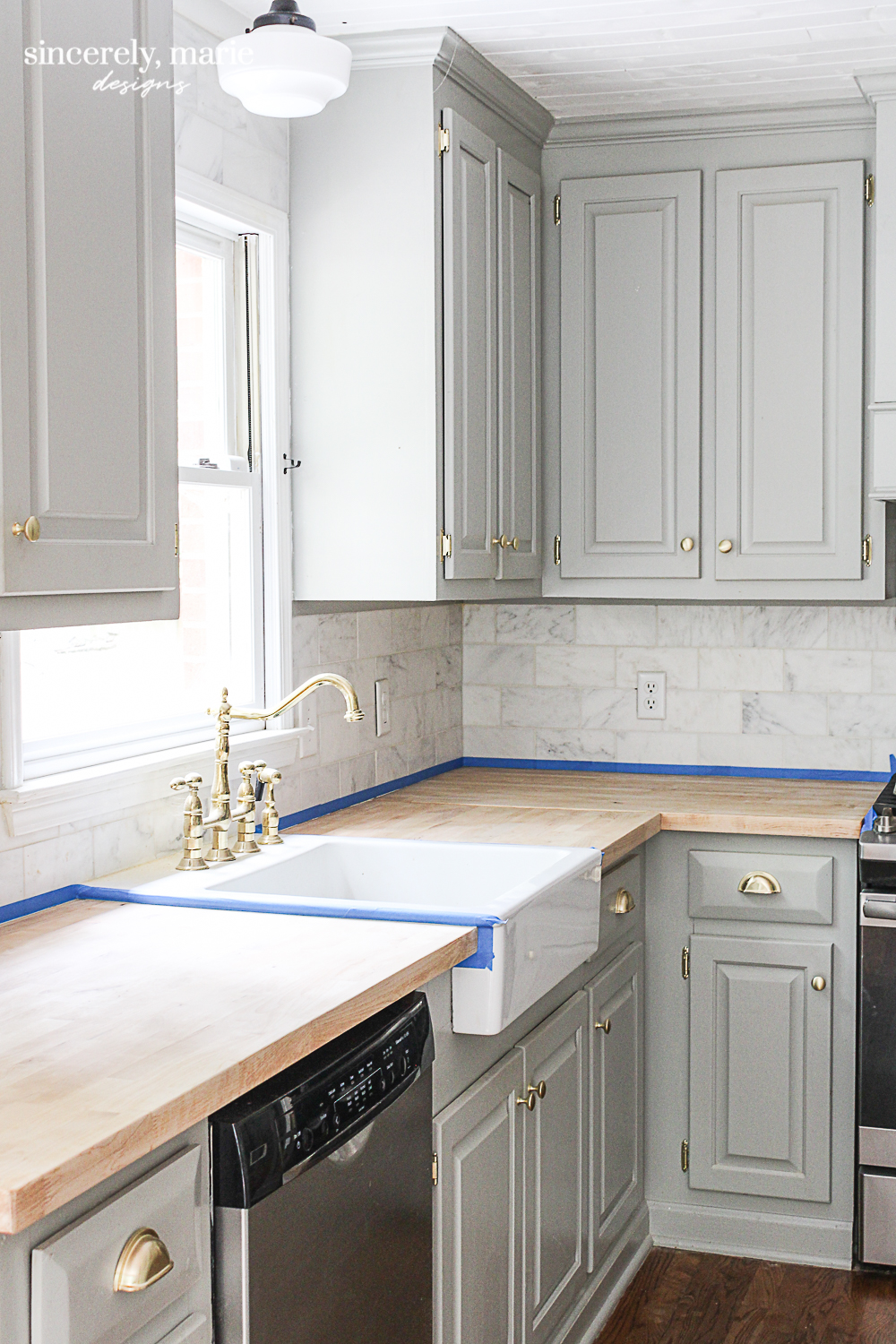
Restoring a Butcher-Block Countertop
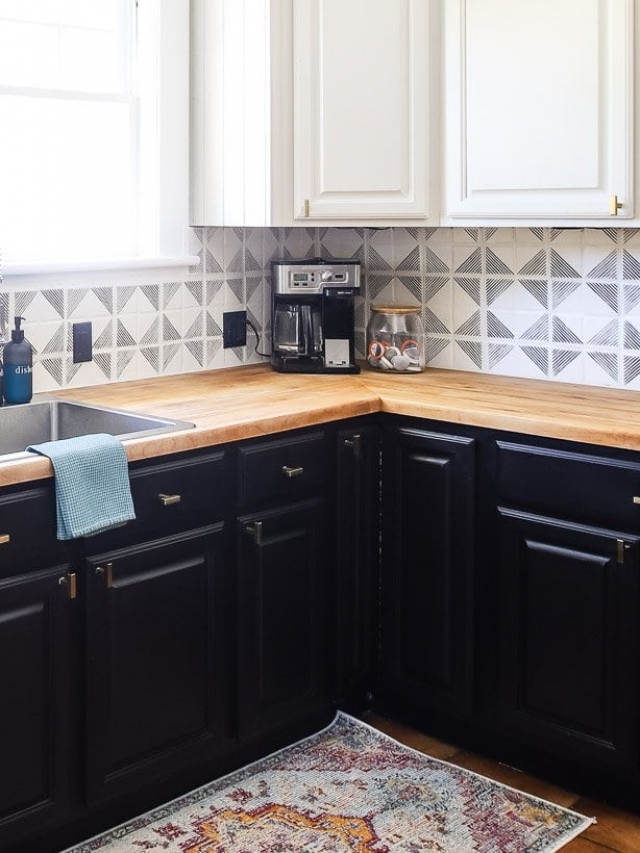
Refinishing Butcher Block Counters u2014 Black Mountain HandyMan, LLC

Related articles:
- Island Butcher Block Countertops
- How To Care For Butcher Block Countertops
- DIY Butcher Block Countertops
- Farmhouse Butcher Block Countertops
- Kitchen Designs With Butcher Block Countertops
- Sanding Butcher Block Countertops
- Butcher Block Countertops With White Cabinets
- Build Your Own Butcher Block Countertop
- Butcher Block Countertop With Tile Backsplash
- How To Stain Butcher Block Countertops